March 7th, 2011 — Uncategorized Tagged Edward R. Murrow, managing online communities, news is a conversation, various social networks
According to Briggs, now that news is a conversation, one of the greatest challenges facing journalists is how to manage, and leverage, that conversation. To prove Briggs’ point, it is best to bring up a quote from one of the most famous journalists of all time, Edward R. Murrow.
“The speed of communication is wonderful to behold. It is also true that speed can multiply the distribution of information that we know to be untrue.”

Today, Murrow’s observation has been truer than ever. According to Briggs, even journalists feeling overwhelmed by new technology can see that more interaction with the audience carries big benefits. However, every opportunity creates questions and challenges:
- How do journalists participate in the conversation without sacrificing their objectivity or credibility?
- What about legal and ethical issues now that everyone can publish anything they want on a professional news site?
- And what happens when you really want the audience to participate, but they don’t?
This chapter addresses those questions and how many people focus on the idea that a future in journalism means managing online communities and participating in various social networks. That’s part of it, but a huge part of news is managing it as a conversation and its outcomes.
February 28th, 2011 — Uncategorized
Zotero is a free program provided by the Firefox database that captures, stores and organizes a variety of information resources. It is a program that helps create your own reference library. The STAR workshop that I attended helped enhance my skills in citing sources and also in finding a new way to create a bibliography. The workshop was taught by Allison O’ Connor, a history professor here on campus.
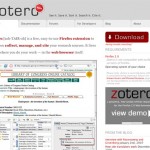
The points made in this workshop was that Zotero allows users to:
- easily manage bibliographic data
- add notes and highlight important information in digital form
- insert citations and bibliographies into Microsoft Word or Open Office documents, using a number of citation styles
- create and export bibliographies from your bibliographic data in numerous styles
This workshop was taught using the George Mason University library catalog and database. The main points in the lecture were as follows:
- Manually adding records
- Capturing data from the web
- Using library catalogs
- Using databases
- Using website citations
- Organizing information in Zotero
- Adding notes in citations
- Searching and indexing
- Adding and editing a bibliography
In this program, the process of citing a source using a given source style is made easier. It is usually just needed to right-click on the cited item or items, then to “Create bibliography”, and the citation will be copied to the user clipboard, thus ready to paste.
The bottom line of this workshop was to show a new and creative way to cite sources and to create your own reference library.
February 28th, 2011 — Uncategorized Tagged 10 tips for suddenly unemployed journalists
When browsing through a blog, is there anything better than coming upon an article that gives you tips on finding another journalism job? Well, that’s what you get when coming upon Mark Potts’ “Recovering Journalist” blog. Since there are plenty of journalists who are out of work, Potts thought it was necessary to speak for them all and give them tips.
As Potts says, “nothing can immediately take away the pain and anxiety that you’re feeling, but hopefully these will help you understand that your situation is not unique and that you’ll be able to get through this.” This is some great advice. Here are the 10 tips for suddenly unemployed journalists.
- Don’t freak out
- Get your finances in order
- Apply for unemployment
- Network like crazy
- Get on Facebook and LinkedIn
- Expand your new media horizons
- Start a blog
- Look beyond journalism for your next job
- Don’t be afraid to ask for help
- Take a deep breath
Each of these tips are pretty straight forward. Potts’ key is patience, for unemployed journalists will find their way back into the media spotlight soon.
February 28th, 2011 — Uncategorized Tagged "1o Tips For Suddenly Unemployed Journalists", Life After Journalism, Mark Potts' "Recovering Journalist" blog, WashingtonPost.com
Since this is the first of many blog items on Mark Potts’ “Recovering Journalist” blog, it’s necessary to go over the format that is distributed on his page. First, there should also be a little background on who Mark Potts is and why I am blogging about his work.
Mark Potts has been a journalist for close to 20 years in both the traditional and digital field. He has been around so long that he has written news stories on typewriters and six-ply paper. From then to now, he has helped to invent ways to read and interact with the news and advertising on computer screens and iPads.
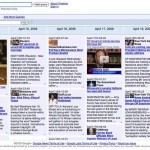
Potts is also the co-founder of WashingtonPost.com and hyperlocal pioneers Backfence.com and GrowthSpur. He has served as editor of Philly.com; and does product-development and strategy consulting for all sorts of media and Internet companies.
The page itself is set up in an “easy to read” format that captures the eye. There are links, pictures and articles everywhere you look. The left column includes the “about me” section, links to his recent posts, recent comments, links to different categories he discusses in his blog posts and even a calendar.
The middle of his page includes his articles, with pictures included that are appropriate to each article. The right column of his page includes a link to his twitter page, essential reading and my favorite part of his page, tips to read that are meant for other journalists who have been laid off. The articles are entitled “1o Tips For Suddenly Unemployed Journalists” and”Life After Journalism,” both intelligent pieces.
I can only say so much about his blog. The rest of the page is meant for you to browse and look at, while I’ll be blogging about his posts later on. Keep in mind what Potts does; his blog layout and articles are helpful for your own blog and future blogs.
February 27th, 2011 — Uncategorized Tagged Atmosphere, audio journalism, Audio slide shows, reporters bring readers even closer to the story
Briggs points out that with just a microphone, recorder and free software, you can create full-featured segments that sound like radio episodes and distribute them as podcasts to build a loyal audience. This is what this chapter is all about: audio journalism.
So why is audio journalism important? Capturing in words a story’s particular sights and sounds has always posed a challenge for every reporter. Since it has been a challenge, reporters have used cheap digital audio recorders to make things easier. With these recorders, reporters bring readers even closer to the story by enhancing their reporting with audio clips.

Also, audio journalism has characteristics that can’t be matched by other forms of media:
Presence: On location, a reporter can literally bring readers to the story. The simple fact of being there boosts credibility and interest.
Emotions: Tone voice, expressions, intonation and pauses–in the words of either the reporter or the sources–can enhance the message.
Atmosphere: Natural sound–the sound that’s naturally happening around you as you report–helps pull the listener in close. Natural sound can be anything–weather sounds, crowd sounds, machine noises, etc.
Audio also offers numerous opportunities even to journalists just getting started:
Reporter overview: Newspapers like The New York Times routinely post quick, simple audio overviews by reporters that accompany their articles.
Podcasts: Regular episodes on a selected subject help build an audience but can be time-consuming and difficult to establish in the beginning.
Audio slide shows: Photojournalists have discovered the power of adding audio to their images to tell richer, more compelling stories.
Breaking news: With free services like Utterli.com, a reporter can file a quick audio report from anywhere by mobile phone, to be published on a Web site.
February 24th, 2011 — Uncategorized
Well, where to start. It’s always difficult to do an “about me” page because you usually don’t feel comfortable talking about yourself too much in great detail. I’ll try to keep it short and sweet.
My name is Alex Howard and I am from Park Ridge, NJ. It’s a small town right outside of the greatest city in the world. Need I say the name? Why not, it’s New York City. Both of my parents are from Queens, and a lot of my family lives in Manhattan. As you can see I have a lot of New York roots.
I have a younger sister who is 18, who is ready for college and ready to graduate high school soon. Wow, does time fly by. My family lives in New Jersey, while I live here in Fairfax with a few friends off campus during the school year. Of course I go home for the holidays.
To end it off here, I am in my junior year and a communications major, sport communications minor, here at George Mason University with a broadcast journalism concentration. I work for the radio station here at Mason, WGMU, and hope to have a career one day in sports radio. I enjoy playing basketball, baseball, tennis and football, and my favorite teams are the New York Jets, Yankees and Knicks. I also love music, both rock and rap, and play bass guitar. Most of the time I love to relax and hang out with friends.
I’ll leave it at that for now, before I feel like I’m writing for an online dating site.
February 24th, 2011 — Uncategorized Tagged editing photos, improve your photography skills, the digital age
The expression, “a picture is worth a thousand words” says what it means. Each picture tells a story and each story captures a certain light. In this chapter, Briggs discusses everything there is to know about the digital age and how it has had a greater impact on photography than any other single skill or ability.
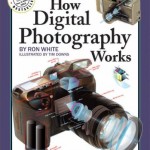
Briggs points out that digital photography is so convenient that it has led so many professions, including police officers, firefighters, real estate agents, doctors, etc. Without digital photography, we would not see images of these professions while they are on the job.
Another factor to point out is that of time, and how more time leads to better photos. In order to improve your photography skills, the first step is to find more time when you go out and shoot. If there is a deadline for a photo, make sure you give yourself enough time to shoot.
The rest of the chapter is all about editing photos, cropping the photo, resizing the picture, modifying the resolution, toning and coloring to correct the picture and most of all, keeping it simple. You do not want to get ahead of yourself and do too much. Remember, the idea of picture taking is to get the right picture, and the rest will follow. Getting the right picture is what matters the most.
February 20th, 2011 — Uncategorized Tagged "defense wins championships", "What Washington Can Learn From the World of Sports", 2012 election, four pillars for a fair and just society, Gutenberg Press, Virginia Senator George Allen
The video conference with former Virginia Senator George Allen was an experience that should be treasured for a long time. It’s not often you can share an experience with a governor, former senator and son of a former hall of fame professional football coach.
A key topic Allen discussed was about his upcoming campaign for the 2012 election as he looks to reclaim the Republican nomination for the U.S. Senate seat. Allen also discussed how things could have gone better back in the 2006 elections after he lost his campaign.
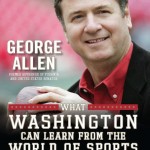
Allen has the utmost confidence for the upcoming elections. “We will be more focused, disciplined and better prepared this time around.”
He also discussed what it’s like to be a part of the federal government and how it is a place where all important decisions are made and every vote counts. However, he was quick to note that the federal government must gain some consistency, which he is trying to instill if he becomes elected again as a U.S. senator.
Another main topic focused on his book, “What Washington Can Learn From the World of Sports”, in which he draws parallels and contrasts between sports and government. Allen suggests that government need look no further than the football field, baseball diamond, or basketball court to solve today’s pressing problems because, in sports, teamwork is essential, cheating is frowned upon and the rules don’t change.
Like in sports, Allen believes that “defense wins championships” and the government “protects liberty for all.” He also stated that people cheer for their sports teams, but nobody is cheering for Washington as of right now.
Another topic discussed was the use of media, and how Allen uses the new media as a great way of communicating with people and hearing their thoughts and viewpoints to become a better candidate. He also believed the Internet is the best invention since the Gutenberg Press for its dissemination of information.
After giving the four pillars for a fair and just society, Allen knew he was ready to reclaim that Senate seat:
- Freedom of religion
- Freedom of expression
- Freedom of private ownership of property
- Rule of law
February 20th, 2011 — Uncategorized Tagged Cristiano Ronaldo crashed his sports car, the classic song by The Who
Now, when I first hear of the words, “going mobile” the first thing that comes to mind is the classic song by The Who. Believe it or not, there are parallels between the song and Chapter 5 of Briggs. The song is all about moving and to keep moving at a rapid pace so you don’t miss out on anything that you wouldn’t want to miss.
According to John Markoff of The New York Times, “the cellphone is the world’s most ubiquitous computer.” Since cellphones carry a lot of information and are always there for us, they change how we live and change how we think about information.
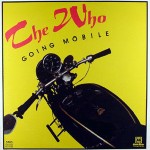
Like the songs tells us, something can happen at any given time so we do not want to miss out. This is exactly what cellphones to for us. For example, when soccer star Cristiano Ronaldo crashed his sports car into a tunnel in Manchester, England in 2009, the first footage was caught on someone’s camera phone and not on a TV camera. Those photos were later used for the front page of the newspaper.
The Ronaldo story is just one of the many stories about how cellphones are so convenient and help us not miss out on something important. Another example is if a bunch of friends go to a concert and you can’t make it. If they all got their phones ready, they can send you pictures and videos of the concert and show what you are missing out on there.
This chapter is all going above and beyond with your cellphone, and to make sure you know it is more than “just a phone.” Make use of the applications, information, features and new technology that cellphone can provide. If it’s on your phone, why not use it?
February 15th, 2011 — Uncategorized Tagged "microblogging", importance of microblogging, instant message journal, This is so much more than just talking about your day
Just when you thought blogging was enough, a new concept called “microblogging” hit the scene within the last few years. The best example of microblogging is Twitter, which is quickly becoming more and more popular each day. Everyone, including all news outlets, now seem to have a Twitter account all of a sudden.

Since this chapter is all about microblogging, it is best to know what this term means. Briggs likes to think of it as an instant message journal. Now I’d say that is well put considering they have to do with short messages with constant updates.
Briggs goes on to describe the importance of microblogging and why it’s so popular:
- It has emerged as an important tool
- An effective medium for breaking news
- Crowdsourcing and building community
- Marketing and building your brand
Briggs goes on to describe the basics of Twitter, how to use it and why it is important to set up an account. So what’s the best advice to take from Briggs? Create a Twitter account, follow other people, check updates and go mobile. This is so much more than just talking about your day.







